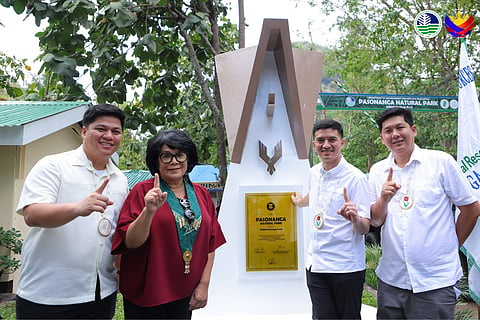
- NEWS
- the EDIT
- COMMENTARY
- BUSINESS
- LIFE
- SHOW
- ACTION
- GLOBAL GOALS
- SNAPS
- DYARYO TIRADA
- MORE

Amid a rapidly warming planet and a tropical archipelago vulnerable to typhoons, droughts and rising seas, Department of Environment and Natural Resources (DENR) Secretary Maria Antonia Yulo-Loyzaga has emerged as one of the most influential stewards of the country’s natural wealth.
Like the ecosystems she quietly but thoroughly protects, Loyzaga works mainly behind the scenes, strategically shaping policies, building institutional muscle, and laying the foundation for long-term climate resilience.
Appointed by President Ferdinand Marcos Jr. in 2022, Loyzaga brought with her a deep well of experience and a scientific acumen sharpened by years of leadership in disaster resilience, climate adaptation, and environmental science.
Her vision is to protect the lifeblood of our economy and ecosystems so that the nation may endure, thrive, and recover amid climate uncertainties.
“The economy doesn’t own the environment,” she said in an exclusive interview on DAILY TRIBUNE’s show Straight Talk. “It’s the environment that supports the economy.”
Under her leadership, the DENR has undergone a transformative recalibration.
She calls it “climate-risk lens” — a national effort to analyze ecosystems and communities through the lens of climate vulnerability and resilience. “We mapped out what we call ‘risk and resilience potential’ of all ecosystems, even for unprotected areas like coasts and forests,” she explained.
This analytical shift has led to the completion of a National Adaptation Plan and a Nationally Determined Contributions Implementation Plan, making the Philippines one of the few countries with a comprehensive framework for climate mitigation and adaptation. But Loyzaga insists the work doesn’t end there. “Now we’re localizing,” she emphasizes.
It’s a science-based, community-first approach that seeks to buffer the most vulnerable sectors, especially fishermen and farmers, from the looming threats of climate change.
“For every one-degree change in the minimum temperature, it has been estimated that there will be a 10 percent decrease in rice yield,” she warned. “We’re watching those temperatures.”
On the coasts, mangrove systems — natural guardians against storm surges — are being treated as strategic assets for disaster risk reduction and their role in what she calls “blue carbon.”
These marine forests absorb carbon emissions, provide spawning grounds for fish, and could soon enter global carbon markets, bringing ecological and economic benefits to local communities.
Loyzaga also presided over establishing the Water Resources Management Office, which unites all water-related government agencies under one roof. Her department has mapped over 2,500 rivers in 421 river basins, 550 lakes and 435 dams.
This enabled the department to land agreements with the National Irrigation Authority and the Department of Public Works and Highways in repurposing idle water rights and infrastructure, aiming to deliver potable water to 15 million more Filipinos, including 100,000 in far-flung barangays.
In another landmark achievement, she spearheaded the creation of the Geospatial Database Office, the country’s first comprehensive catalog of natural resources. This database enables smarter environmental decisions, backed by satellite data and artificial intelligence for better forecasting.
Loyzaga’s scientific rigor and international standing have also elevated the Philippines on the global environmental stage.
Under her guidance, the country has rejoined the International Union for Conservation of Nature (IUCN), regaining its place among global biodiversity champions.
Because of her, the Philippines was chosen to host the Board of the Loss and Damage Fund, a mechanism established at COP28 to aid vulnerable nations in climate recovery.
On the home front, eight new maritime science research stations have been established to expand domain awareness and improve marine resource management. Meanwhile, Project Transform is being implemented in LGUs nationwide to institutionalize multi-stakeholder environmental governance.
Perhaps one of the most ambitious initiatives launched under her tenure is the “10 million trees in 3 years” campaign, targeting reforestation in six critical areas.
The project has won the backing of major corporate players, including the Aboitiz, Ayala, Lopez, MVP and SM groups.
Moreover, Loyzaga has ensured conservation efforts extend to the country’s most vulnerable species.
For the first time, DENR has secured national budget allocations to protect the tamaraw, Philippine eagle, Palawan cockatoo, dugong and marine turtles — all critically endangered species facing extinction.
Through it all, Loyzaga has maintained a steady compass, balancing economic imperatives with ecological responsibility.
She acknowledges the tightrope between development and protection, particularly in resource-rich sectors like mining. The goal is “Responsible ramping up,” ensuring that as the country builds, no community is left behind and no natural system is pushed beyond its limits.
“Our dependence on ecosystems has a direct impact not just on livelihood but on the economy in general,” she said. “If we cannot get food, if we cannot get water, if we cannot secure our energy operations, or draw on our minerals for infrastructure, we will have serious problems reaching our Philippine development goals.”
In an age of climate reckoning, where the most minor temperature shift can upend entire economies, Secretary Maria Antonia Yulo-Loyzaga’s work reminds us that actual progress often lies not in what is seen but in what is safeguarded.
Under her watch, the DENR is doing just that — quietly, deliberately, with science, integrity and purpose.
